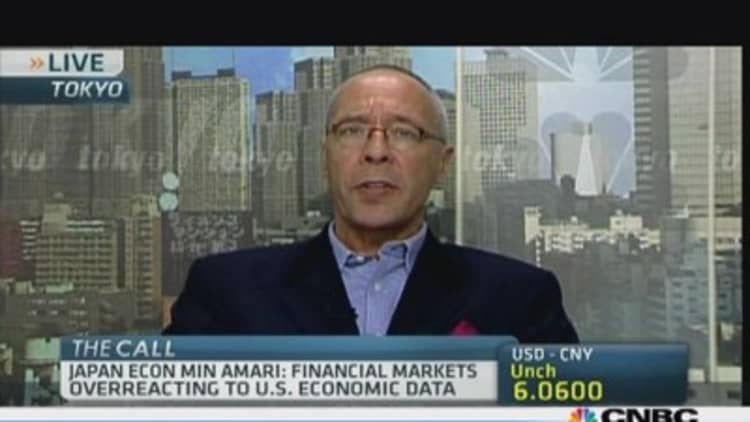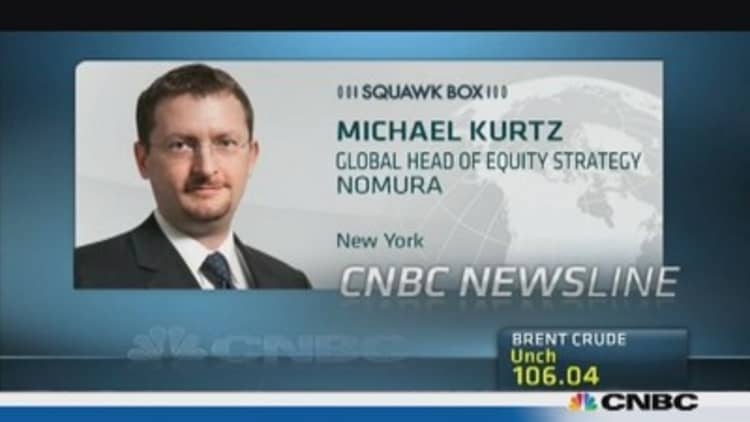Asian equity markets suffered heavy losses on Tuesday after Wall Street shares tumbled overnight as weak economic data sparked fears of a slowing U.S. economy.
U.S. stocks saw their worst start to February since 1933 after a manufacturing report heightened concern about the economy before Friday's monthly jobs report. Overall factory activity hit an eight-month low in January as new order growth plunged by the most in 33 years.
In a sign of heightened investor jitters, the CBOE Volatility Index rose above 20 on Monday for the first time in four months, while the yield on the 10-year Treasury note hit a three-month low.
"Suffice to say investors should steer clear of risk assets over the short term as the turmoil does not look like it will be over anytime soon. A combination of tapering, a confluence of country specific emerging market country concerns and weaker growth in China provide the backdrop for a volatile few weeks if not longer, ahead," said analysts at Credit Agricole.
(Read more: Why the stock selloff is more a rumble than rout)
Nikkei slumps 4.2%

Japanese stocks closed at its lowest levels in four months after the yen jumped to a two-month high against both the U.S. dollar and euro. The Nikkei is down 12 percent since hitting a six-year peak of 16,320 points on December 30, placing the index firmly in correction territory.
Furthermore, the index fell below its 200-day simple moving average (SMA) of 14,421 points for the first time since November 2012.
Suzuki Motor and Mitsubishi Electric were some of the biggest losers, down 6 percent each while Sharp lost 8.3 percent. Mitsubishi UFJ Financial declined 3.6 percent despite a 48 percent rise in group-profit for the nine-months through December.
Panasonic and Toyota Motor lost 7 and 6 percent, respectively ahead of posting earnings later in the day.
(Read more: How bad will the Nikkei meltdown get?)
Sydney tanks 1.7%
Australia's benchmark S&P ASX 200 hit an eight-week closing low while the Australian dollar jumped as much as 1.4 percent to a near two-week high of $0.8875 against the greenback after the Reserve Bank of Australia left interest rates on hold, as expected.
Noticeably, the central bank dropped its easing bias in its monetary policy statement, saying that the most prudent course of policy was a period of stability in interest rates.
"A pick-up in the inflation rate to 2.7 percent year on year in the fourth quarter showed that the room for more easing is very much limited and we continue to think that the easing cycle already finished in August last year," wrote analysts at Credit Agricole in a report.

All of the 'Big Four' lenders tanked over 1.5 percent each after Nomura warned that lenders face more risks from competition in the mortgage market.
BHP Billiton lost 2.6 percent after copper fell to two-month lows while Atlas Iron and Mount Gibson tumbled 3 and 6 percent, respectively.
(Read more: Copper's swoon - Bad omen for China?)
Kospi 1.7% lower
South Korean shares extended losses to hit fresh five-month lows as Asia-wide pessimism overshadowed upbeat economic data. Annual consumer price inflation in January was unchanged from the previous month thanks to stabilizing agricultural product prices.
Among blue-chips, Hyundai Motor lost 2.3 percent after sales of automakers dipped 2.1 percent in January from a year earlier while Samsung fell nearly 2 percent.
Meanwhile, the recovered after hitting a 5-month low earlier in the session, one day after posting its biggest loss in more than seven months.
(Read more: Emerging markets – is it time to bottom fish?)
Emerging markets watched
India's benchmark BSE index closed higher after declining as much as 1.2 percent to a four-month low. The BSE index provisionally rose 0.22 percent, while the broader NSE index ended flat.
Malaysian shares closed 1.4 percent lower at 1778.83 points, while Thailand's closed down 1.2 percent in thin trading. Philippine shares closed down 2 percent.
In the currency space, the rupiah, and baht rose against the dollar while the Philippine peso hit its weakest level since August 2010.
Markets in Shanghai remain closed for the Lunar New Year holiday.
— By CNBC.com's Nyshka Chandran. Follow her on Twitter @NyshkaCNBC

